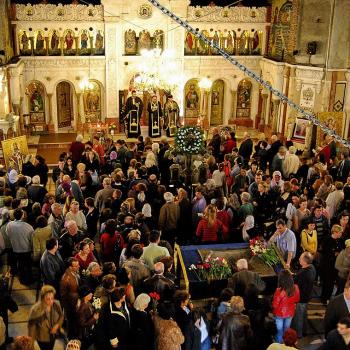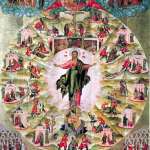
Prayer, fasting and almsgiving are three key elements of a Christian life.
While the church emphasizes all three of them during the Great Fast, they should remain with us throughout the year. When we come to the Great Fast, we are encouraged to do a spiritual checkup, to see how far we have abandoned good, healthy spiritual practices, and then find ways to reengage them so that we can once again properly align ourselves with God.
We need prayer, not only as a way of developing our relationship with God, but as a way of developing who we are as a person. This is because to be a person means we go beyond individuality by finding ourselves in relationships with others. The doctrine of the Trinity teaches us that God is personal, that in and through his love, the Father, Son and Holy Spirit reveal their own personal status as they then relate themselves to us. We, in turn, find our proper place in the world when we come into a right relationship with the three-personed God. As we grow into the people we are meant to be, our relationship with others also grows. We will find that our loving relationship with God is reflected in our loving relationship with others. Prayer opens us up to that love. Interacting with God shows us how it is to be people who love, and then how to engage others in a similar, prayerful spirit. Our communion of the saints and with each other is the outcome of our prayer with God.
The purpose of fasting is not to make us eat less food; it is about reforming our lives, eliminating various unhealth attachments to the various goods found in creation. Fasting represents the ascetic aspect of the Christian life, the drive to purify ourselves from inordinate wants and desires that lead us astray. Through such discipline, we can find peace. We slowly learn how to overcome various addictions which we have allowed to take control of our lives. Not everyone is addicted to the same thing. Not everyone is addicted to drugs or alcohol or sex. We can be addicted to many things which, in moderation, are good, but when taken to excess, disrupt our lives and hinders our personal development. Gluttony can be seen as an addiction to food. Fasting teaches us the kind of self-discipline needed to overcome our inordinate tendencies. Spiritual writers recognized that those who find themselves giving in to excessive eating easily give in to other temptations, while those who learn how to control their eating habits learn how to take control of other aspects of their lives. To become all we can be, then, we learn to control ourselves, to not let our appetite control us. We can then learn from that experience so we do not let other aspects of our lives gain undue control over us and decenter us from a healthy spirituality.
Almsgiving is not really about handing out money, it is about how we give so that we form habits which increase our charitable disposition to others, especially to those most in need. Not everyone has money to give, and not everyone who gives money necessarily does so out of true charity. What is important is that we develop charity, that is, love. If we provide some money to someone else without any sense of love involved in our action, we have not truly engaged in the virtue associated with almsgiving. Likewise, if we give to others in ways which do not include money, if we do so out of love, we truly have practiced the virtue of almsgiving. Nonetheless, even those who give out of improper motivations, such as vainglory, still gain something when they give alms, for by giving to those in need, they develop a better sense of what such need is, and the more they see what such need is, the more likely they will grow a compassionate heart and then give out of love.
The three, prayer, fasting, and almsgiving go together. They help inspire each other. Those who give out of love find their love growing; with that love, they grow closer to the God who is love. Those who give up some undue attachment to the world, likewise, find their love growing, and so find themselves coming closer to God. Those who truly engage God in prayer will find that their encounter with God will transform them, making them become more like the God. They will develop a greater sense of love and engage in the virtue of almsgiving in whatever way that they can. The three go together, but of the three, almsgiving is the easiest to use as the foundation for our spiritual life; from there, we can grow in love, develop our prayer life, and find ourselves slowly giving up all that stops our personal growth in and with God. Or, as St. Maximos the Confessor says:
Almsgiving heals the soul’s incensive power; fasting withers sensual desire; prayer purifies the intellect and prepares it for the contemplation of created being. For the Lord has given us commandments which correspond to the powers of the soul.[1]
Almsgiving overcomes our lack of uncharity, our anger and wrath; it diverts us away from the poison of hatred. As love is the greatest of the theological virtues, so it is love which we should embrace first and foremost. This is why almsgiving, charity, can be said to be the foundation of our spiritual life. Then, we need to purify our body and mind. Fasting represents all the bodily purifications which we need to embrace, while prayer helps purify our intellect, shaping and forming it so that it pursues what is truly good and just instead of the various desires which our imagination brings to us that can never satisfy.
The commandments of God, the encouragement of the church, is given to us for our own sake, not his. We harm ourselves when we reject love, or when we do not pacify our mind and body from the various temptations which come upon us every day. We must always remind ourselves that we are trying to develop who we are in God, and we do that by becoming more and more loving in all we do. When we pursue prayer, fasting, and almsgiving, we must do so in such a way that we also do not become so attached to what we are doing that we lose sight of the purpose of our actions. We can be so consumed by prayer, we neglect those who come to us, and so acting uncharitably, actually hinder our spiritual development. For this reason, spiritual writers tell us that we must pursue all things in charity, and not be upset if we become disrupted in our times of prayer:
If while you are signing a song of prayer to God, one of your brethren knocks at the door of your cell, do not opt for the work of prayer rather than that of love and ignore your brother, for so to act would be alien to God. God desires love’s mercy, not the sacrifice of prayer (cf. Hos 6:6). Rather, put aside the gift of prayer and speak with healing love to your brother. [2]
By being with others and sharing them our love, we embrace the love which we should be pursuing. The prayer which we put aside is only a particular form of prayer, that of thoughts and words. By embracing others and showing them our love, we are actually continuing our prayers, doing so by responding to God as he is found in his image in other people.
Similarly, we can use the tool of fasting against its own purpose, and so become attached to abstinence we do not really follow the spirit of the fast. If we are met by others who require our attention and social companionship in a way which requires us to eat with them while violating the externals of some fast we might be keeping, we will be following the spirit of the fast itself. The fast is not broken, but rather, fulfilled, when we treat others out of love:
We should, however, do our abstaining and fasting in such a manner that we do not put ourselves under the necessity of fasting or abstaining; otherwise, we shall be doing an optional thing under constraint rather than out of piety. If, for instance, interrupting my fast, I give refreshment to some visitors, I do not break my fast, but I fulfill a duty of charity. Again, if by my abstinence I sadden my spiritual brethren, who I know derive enjoyment from my unbending self, my abstinence shall be called not a virtue but a vice because continued abstinence and fasting, unless interrupted when occasion requires, actually makes me vainglorious and saddens my brother, whom charity requires me to serve; and it certainly shows that I have no fraternal charity. [3]
It’s easy to see how prayer, fasting, and even giving money to others, can be abused when we do all such things with the wrong spirit. We must always remember they are meant to be tools to help build us up. We need to continuously grow in love, for that is what we shall be doing in the eternal becoming of theosis. Vainglory always pursues attachment to some particular state of our personal growth, stops us there, and ties to make that as being who we are meant to be. In doing so, we hinder our potential by attaching ourselves to a limited good. We must strike at that false persona, at that self which we have constructed as a result of such attachments, and let it die, so we can become even greater.
Only when we engage them in the spirit and wisdom of love can we properly use the spiritual tools of prayer, fasting, and almsgiving. The more we develop our love, the easier it will be for us to discipline ourselves in such a way as to let that love grow. The more we develop our love, the easier it will be for us to commune with God and experience his love. The more we develop our love, the more we become who we are meant to be, and so the less there is left needed for our perfection. Thus, St. Bonaventure explains, the parable of the workers in the vineyard can be interpreted as a way of understanding how there is less work to do once love has helped us grow in virtue:
Notice that the later the cultivators of the Lord’s vineyard arrived, the less they worked. For the later the day of our progress grows, the practicing of virtues becomes more and more sweet; and the more the appetite of our desires is subdued, the weight of the day and heat is felt less and less. The more our love grows, the more our labor decreases. Indeed, the yoke and burden which seems intolerable at first become sweet and light through love. [4]
Not everyone has equally developed themselves. This is why the church, in its wisdom, has times of fasting to help remind us to pursue our own spiritual progress. These times help us recenter ourselves so that we do not let the small vanities of life distract us and keep us from finding the happiness which we desire. St. John Chrysostom, understanding this, was saddened when he saw many of his congregation ignore the spirit of the fast and kept to their worldly vanities:
Recently, a fast was publicly announced, but few fasted. People come to church and pass the time telling stories or conducting worldly business rather than saying prayers. Poor people complain about their lack and their need, but no one gives alms. And we are surprised if we endure various trials, though we have minds so hardened in every respect. Therefore let us correct our negligence, and let us return to the Lord with our whole heart. Let us devote ourselves to fasting, prayer, and almsgiving, so that we may also deserve to hear what was said to Cornelius by the angel: “Your prayers have been heard, and your alms have ascended in remembrance before God” [Acts 10:4].[5]
We must embrace the path of love set up by Christ. We must make sure we do not neglect those in need. Prayer, fasting, and almsgiving play a central role in developing such love in us. We should embrace them during the Great Fast. But once the Great Fast is over, we must not cast them aside, thinking we have done all we need to do. Rather, we should embrace what we have learned and continue with them, so that we can come that much closer to God and receive that much more of a share of the glory which God has held in reserve for us all. It is important for us to take up prayer, fasting, and almsgiving holistically so that they come together and become one. That means, we must not embrace one while ignoring the other two. Then, when we truly bring them together, and put them into practice, we will find ourselves becoming all that we can be.
[1] St. Maximos the Confessor, “First Century on Love” in The Philokalia: The Complete Text. Volume Two. Trans. G.E.H. Palmer, Philip Sherrard, Kallistos Ware et. al. (London: Faber and Faber, 1990), 61-2 [#79].
[2] Nikitas Stithatos, “On the Inner Nature of Things and on the Purification of the Intellect” in The Philokalia: Volume IV. Trans. and ed. G.E. H. Palmer, Philip Sherrard, Kallistos Ware, et. al. (London: Faber and Faber, 1995), 128-9 [#76)
[3] Julianus Pomerius, The Contemplative Life. Trans. Mary Josephine Suelzer, PhD (Westminster, MD: The Newman Bookshop, 1947), 98.
[4] Richard of St. Victor, “On the State of the Interior Man,” in Victorine Texts in Translation: Writings on the Spiritual Life. Trans. and ed. Christopher P. Evans (Hyde Park, NY: New City Press, 2014), 285.
[5] St. Chromatius of Aquileia, Sermons and Tractates on Matthew. Trans. Thomas P. Scheck (New York: Newman Press, 2018), 24 [Sermon 3].

















